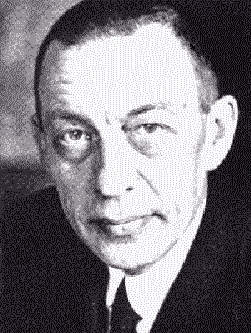 Vladimir Horowitz
(48 seconds)
Vladimir Horowitz
(48 seconds)
A 1951 recording, with Fritz Reiner conducting the RCA Victor
Symphony, on Horowitz Plays Rachmaninoff (RCA 7754-2-RG). Nobody blends such
overwhelming force with such clarity, or with a piano sound that stays so rich and warm,
even when excitement mounts. Download
(93k)
 Vladimir Ashkenazy (53 seconds)
Vladimir Ashkenazy (53 seconds)
With Andre Previn conducting the London Symphony, a 1972 recording
(London 417 764-2, coupled with Ashkenazy playing five Rachmaninoff preludes). Very much
in the Horowitz tradition, though Ashkenazy's style might be even grander. Certainly he
takes more time, and gives nearly every major detail lots of extra weight. Download (104k)
 Earl Wild (41 seconds)
Earl Wild (41 seconds)
A different kind of reading, from 1966, with the extraordinary Jascha
Horenstein conducting the Royal Philharmonic (available in several versions; the best
might be Chandos Chan 6507, where it's coupled with the Second Piano Concerto). Pianist
and conductor sweep through the passage in a single breath. I might miss Horowitz's
romantic detail, but the performance takes my breath away. Download (80k)
 Jean-Yves Thibaudet
(48 seconds)
Jean-Yves Thibaudet
(48 seconds)
With Ashkenazy -- yes, the pianist -- conducting the Cleveland
Orchestra (coupled with Rachmaninoff's first concerto on London 448 219-2). To my taste,
this 1995 recording is the best of the modern versions. Thibaudet doesn't play with the
light and shade of the old romantic school, but in sheer strength and command -- grandeur,
even -- he's the equal of any pianist here. If the excerpt here seems deficient in poetry,
listen to the complete performance to see how understanding, commitment, and sheer
virtuosity make an impact of their own. Download
(96k)
I interviewed Thibaudet for a piece I published in the Wall
Street Journal on April 28. He seems to be a sweet man, wonderfully flirtatious and
informal. Among other things, we talked about this recording, and Thibaudet told me --
with disarming honesty -- that he's "reassured" by Rachmaninoff's own version,
which (as you'll hear below) is in its own way pretty cerebral. (You can read my Thibaudet piece right here on my site.)
 David Helfgott (49 seconds)
David Helfgott (49 seconds)
Live 1995 performance. Milan Horvat conducts the Copenhagen
Philharmonic (RCA 74321-40378-2.). With the Rachmaninoff second sonata, and four preludes.
Helfgott gets the notes out in this excerpt; elsewhere he's not so lucky. But notice how
little he does with the music; he plays it almost like a child. Listen especially to the
tempo change right before the fadeout, where Thibaudet, for instance, takes immediate
charge of the music's new direction, and Horowitz adds a a sense of impish playfulness.
With Helfgott, it has no character at all. Download
(98k)
 Sergei Rachmaninoff (40 seconds)
Sergei Rachmaninoff (40 seconds)
If we held a play-it-like-the-composer contest, the winners would be
Thibaudet and Earl Wild, because Rachmaninoff, too, takes this passage in a single surge.
He makes the music flow more naturally than anyone -- hey, he wrote it! -- and might outdo
even Horowitz in sheer power and depth of sound. But he doesn't sound like he cares very
much. The tempo change sounds alert, but almost brutally matter-of-fact. With Eugene
Ormandy conducting the Philadelphia Orchestra, on the two-CD Rachmaninoff Plays
Rachmaninoff, which gives you all four piano concerti and the Rhapsody on a Theme
of Paganini. The Second Concerto, in a 1929 performance with Stokowski conducting, is
a melting standout (RCA 09026-61658-2). Download
(78k)
 Martha Argerich (41 seconds)
Martha Argerich (41 seconds)
I've added this by popular demand -- every month or so someone e-mails
to ask why Argerich's recording isn't here. And really I should have added it long before,
since this version of the concerto is so famous. I have to say, though, that I don't care
for it. Argerich, to me, sounds overexcited, even frenzied, and above all not centered
anywhere in the piece. Every passage seems equally intense (more or less), and so I
get tired listening. This excerptturns out to demonstrate some of what I'm saying. Note
the heated pauses before big chords as the melody subsides. To some people, I'm sure,
these make the passage wild and exciting, demonstrating the passion and sincerity people
love Argerich for. To me, the pauses are overdone, and the chords sound bangy. Compare,
for a polar opposite, the Earl Wild version, which -- flowing and uncomplicated, but still
exciting -- sounds, very simply, like music. Download (84k)

